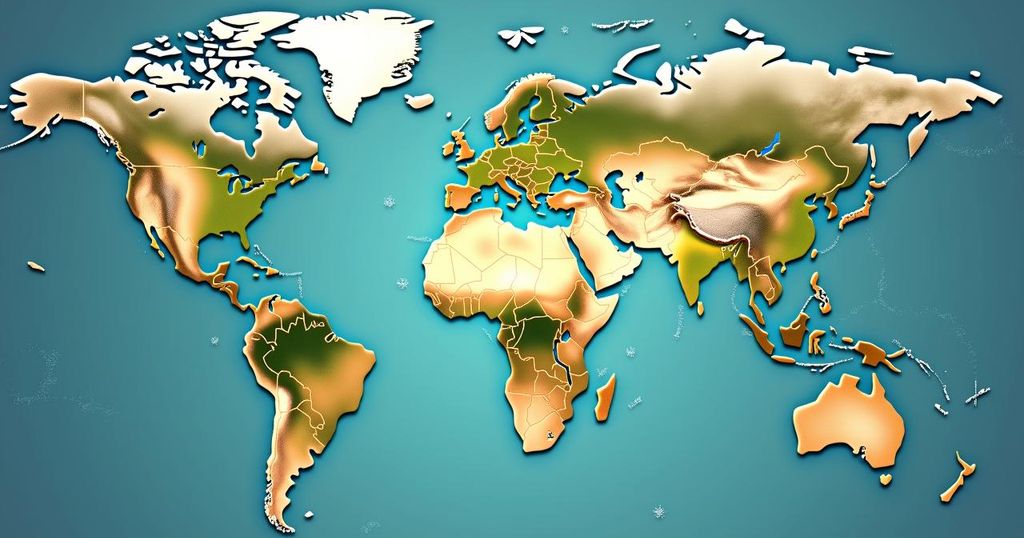A Sustainable Global Universal Basic Income: Addressing Poverty and Climate Change through Innovation

The article presents a model for sustainable global universal basic income (UBI) through a ‘cap and share’ scheme for fossil fuels. It highlights Pope Francis’s advocacy for UBI as a means of addressing poverty and inequality, particularly in the Global South, which lacks resources to implement its own UBI. By imposing a charge on fossil fuels and a progressive wealth tax, the model proposes funding UBI while facilitating a transition to a more sustainable green economy. The article emphasizes the necessity of addressing both climate change and economic inequity, urging policymakers to consider this integrated approach as viable solutions are explored during international climate discussions.
The imperative for a sustainable global universal basic income (UBI) is increasingly evident in a world grappling with escalating inequality and climate challenges. This article outlines an innovative model through a ‘cap and share’ scheme for fossil fuel extraction, which not only addresses economic disparity but also takes significant strides towards climate justice. Pope Francis, during his speech at the World Meeting of Popular Movements, reiterated the necessity for a global UBI, deeming it a matter of compassion and justice. His advocacy aligns with a broader international initiative promoting income redistribution via unconditional cash payments to support basic needs and economic security as a fundamental human right. A global UBI transcends the issue of poverty alleviation; it is fundamentally about social equity. The historical context of wealth concentration in the Global North has left many countries in the Global South without the necessary fiscal resources to establish national UBIs. Hence, a global approach to UBI could effectively eradicate poverty while facilitating an equitable redistribution of wealth. Concerns regarding the financing of UBI often arise, with critics emphasizing the fiscal burden it could impose. However, a report from Equal Right, a nonprofit organization which advocates for UBI, proposes sustainable financing through a global charge on fossil fuel extraction. By imposing a fee of $135 per ton of fossil fuels, it anticipates generating $5 trillion annually, sufficient to implement a UBI of at least $30 per month. In addition to the fossil fuel charge, revenue could be bolstered through a progressive wealth tax on the ultra-wealthy and a minimal financial transaction tax. Together, these measures could ensure a substantial contribution towards funding a global UBI. While the proposed UBI amount may seem modest, it represents a lifeline for the estimated 712 million individuals living in extreme poverty, evidenced by successful pilot programs in diverse locations including Canada, India, and Brazil. These initiatives illustrate the profound social and economic benefits of direct cash payments to individuals. Despite these promising avenues for sustainable funding through taxing carbon and wealth, it is crucial to recognize their inherent limitations. As carbon emissions diminish and wealth distribution becomes fairer, the resources available for taxation are likely to decrease, posing a potential threat to the viability of UBI in the long run. To counteract this risk, a robust financial strategy is essential. In response, Equal Right proposes establishing a Global Commons Fund (GCF), aimed at ensuring the sustainability of UBI while facilitating a transition to green economies, particularly in the Global South, which often faces high-interest debt cycles. This fund would utilize revenues from the fossil fuel charge, re-invest in sustainable projects, and distribute UBI dividends, aiming for long-term self-sustainability akin to successful sovereign wealth funds like Norway’s. To prevent further exploitation, a global cap on fossil fuel extraction must be instituted, with fees attached for extraction beyond scientifically determined thresholds. By integrating the objectives of funding a global UBI with mitigating climate change, the ‘cap and share’ model proposes a synergistic solution that could pave the way for a more equitable and sustainable future. Moreover, a UBI has the potential to drive environmental transitions; studies show that households receiving basic income are more inclined to adopt cleaner energy sources. As the international community approaches critical climate discussions such as COP29, it is imperative for policymakers to contemplate the transformative capacity of a ‘cap and share’ system. This pioneering approach promises not only to support Pope Francis’s vision for global UBI but also to champion climate justice, ultimately fostering economic equity and ensuring that all communities are supported in their pursuit of a sustainable future.
In the context of growing economic disparity and climate change crises, discussions surrounding universal basic income (UBI) have gained substantial traction. The concept posits that individuals should receive regular, unconditional cash payments to address basic living needs. Advocates argue this supports a fundamental human right and addresses systemic inequalities exacerbated by historical resource exploitation. Various models for implementing UBI have emerged, including global initiatives aimed at redistributing wealth from more affluent regions, particularly the Global North, to those in the Global South, which often lacks adequate resources to fund similar programs. This article highlights the ‘cap and share’ approach, which links UBI funding to sustainable fossil fuel extraction practices, thereby addressing both economic and environmental justice in a synergistic manner.
The exploration of a sustainable global universal basic income illuminates a potential pathway to address both poverty and climate change through innovative financial models such as the ‘cap and share’ system. By levying charges on fossil fuel extraction and implementing equity-focused taxation on the wealthy, this proposal seeks not only to fund a UBI but also to foster a greener economy and mitigate environmental degradation. Pope Francis’s advocacy for global UBI reflects a broader call for justice and equity that resonates across the socio-economic spectrum, underscoring the interconnectedness of climate and social justice. As such, embracing these comprehensive approaches offers a promising and necessary route towards a fair and sustainable future for all individuals on our planet.
Original Source: www.aljazeera.com








